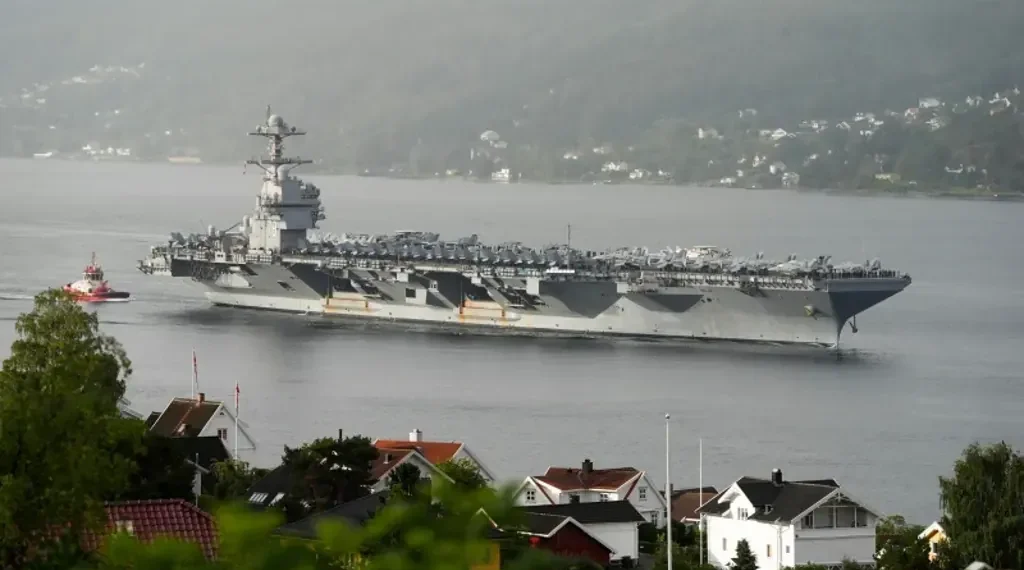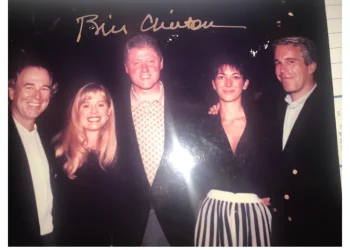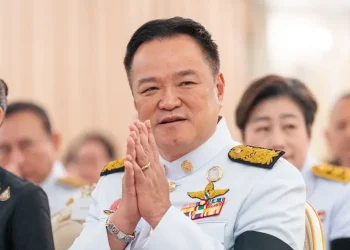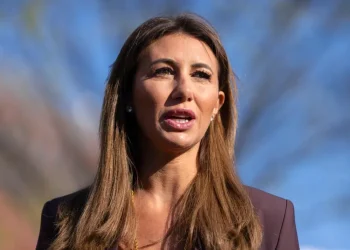Trump Suggests Diplomatic Talks With Maduro as U.S. Expands Naval Operations in Caribbean
President Donald Trump indicated the United States might hold discussions with Venezuelan President Nicolás Maduro. This comes as Washington deploys its most advanced aircraft carrier in decades, intensifying a counterdrug mission that has drawn regional attention.
Military Buildup Signals Potential Diplomatic Opening
President Trump said Sunday that the U.S. “may be having some discussions” with Maduro. He made the comment as the Navy’s USS Gerald R. Ford arrived in the Caribbean, suggesting a possible diplomatic channel while U.S. forces step up operations against suspected narcotrafficking networks.
Speaking in Florida, Trump offered few details. He said, “Venezuela would like to talk,” and added, “I’ll talk to anybody. We’ll see what happens.” When pressed on the meaning, he responded, “What does it mean? You tell me, I don’t know.”
Venezuela’s government did not immediately respond. Maduro, facing U.S. narcoterrorism charges, has consistently accused Washington of attempting to provoke a confrontation.
USS Gerald R. Ford Leads Largest Regional Naval Deployment in Decades
The Navy confirmed that the USS Gerald R. Ford and several support ships are part of “Operation Southern Spear.” The mission aims to disrupt drug trafficking in the Caribbean and eastern Pacific. U.S. Southern Command said nearly a dozen vessels and about 12,000 sailors and Marines are involved.
Rear Adm. Paul Lanzilotta said the forces aim to “protect our nation’s security and prosperity against narco-terrorism in the Western Hemisphere.” The Ford, carrying fighter squadrons and multiple destroyers, passed the Anegada Passage near the British Virgin Islands early Sunday.
Analysts say the deployment is a clear escalation. Aircraft carriers traditionally project power and deter adversaries. While not designed specifically to combat cartels, the Ford could pressure Maduro strategically.
Maritime Strikes Raise Fatality Concerns
The carrier’s arrival coincided with another deadly U.S. strike. Southern Command released video of a small vessel exploding in the eastern Pacific. Three men reportedly died.
Since early September, U.S. forces have conducted 21 similar strikes, leaving at least 83 people dead. Officials claim the vessels were operated by narcoterrorist groups but have not provided public evidence. Human rights organizations and regional leaders are seeking clarification on targets and legal justification.
U.S. Expands Training Across the Caribbean
Joint Exercises in Trinidad and Tobago
U.S. Marines from the 22nd Expeditionary Unit are training in Trinidad and Tobago for a week. The exercises focus on reducing violent crime and improving maritime security. Trinidad lies only seven miles from Venezuela and serves as a key transit point for cocaine shipments.
Foreign Minister Sean Sobers said this is the second joint operation in less than a month. The exercises build on growing cooperation with the U.S. government. The prime minister supports the strikes, calling them necessary to curb regional trafficking.
Venezuela criticized the exercises, calling them aggressive and provocative.
Training Initiatives in Panama
U.S. Army Secretary Dan Driscoll said troops are also training in Panama. Washington is reopening a “jungle school” used for operations in dense terrain. Driscoll added that forces are “ready to act” if directed by the president or Defense Secretary Pete Hegseth.
Experts note that the expanded presence signals a U.S. strategic shift, moving attention from the Middle East and Asia toward Latin America.
Administration Defends Counterdrug Mission
U.S. officials emphasize that the military buildup aims to stop illegal drugs from entering the country. Trump described the strikes as part of an “armed conflict” with foreign terrorist organizations, claiming cartels threaten U.S. national security.
Critics, including some Republicans, have demanded more information about targets and legal justification. Human rights groups and the U.N. have called for transparency and proportionality in these operations.
Asked Friday if he had decided on a broader strategy, Trump said, “I sort of have made up my mind,” without elaboration.
Venezuela Mobilizes as Tensions Escalate
Venezuelan authorities announced a “massive” mobilization of troops and civilian volunteers. Maduro and senior officials held rallies to support neighborhood committees linked to the Socialist Party.
Venezuela has repeatedly said U.S. military presence is an attempt to undermine its sovereignty. Support for Maduro remains divided amid political disputes and economic instability.
U.S. to Label Venezuelan Cartel a Foreign Terrorist Organization
Secretary of State Marco Rubio reaffirmed that the U.S. does not recognize Maduro as Venezuela’s legitimate leader. He called the government a “transshipment organization” that collaborates with drug traffickers.
Rubio announced that the Cartel de los Soles (Cartel of the Suns) will be designated a foreign terrorist organization. Starting Nov. 24, providing material support to the cartel or its members will be a crime under U.S. law.
U.S. officials allege Maduro and senior associates lead the cartel. Venezuelan authorities deny these accusations.
Regional and International Reactions Remain Cautious
The U.N. human rights office and several Latin American governments expressed concern over the potential for escalation. Some fear that U.S. operations could destabilize fragile regional dynamics, including migration and maritime borders.
Elizabeth Dickinson, senior Andes analyst at the International Crisis Group, said the deployment sends a strong message. “This is the anchor of what it means to have U.S. military power once again in Latin America,” she said. “It has raised anxieties in Venezuela and throughout the region. Everyone is watching closely to see how far the U.S. is willing to go.”
This article was rewritten by JournosNews.com based on verified reporting from trusted sources. The content has been independently reviewed, fact-checked, and edited for accuracy, neutrality, tone, and global readability in accordance with Google News and AdSense standards.
All opinions, quotes, or statements from contributors, experts, or sourced organizations do not necessarily reflect the views of JournosNews.com. JournosNews.com maintains full editorial independence from any external funders, sponsors, or organizations.
Stay informed with JournosNews.com — your trusted source for verified global reporting and in-depth analysis. Follow us on Google News, BlueSky, and X for real-time updates.














